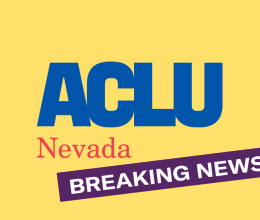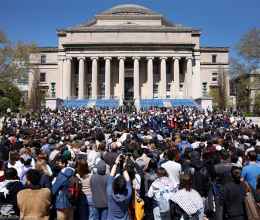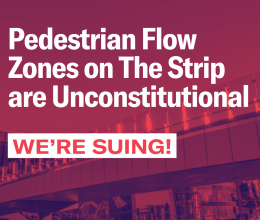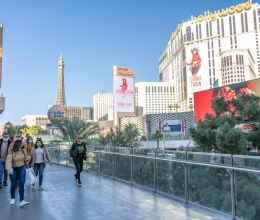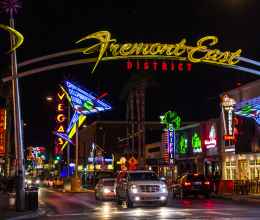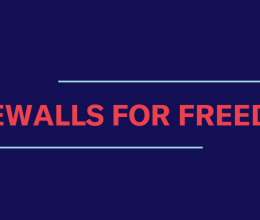
This piece was originally published by the Nevada Current by Michael Lyle.
The City of Las Vegas unanimously adopted an ordinance that prohibits people convicted of any crimes committed within the tourist corridor downtown from returning to the area.
While the city’s “order out corridor” ordinance, modeled after a Clark County law passed in August 2022, goes into effect Sunday, the council said it plans to consider expanding the ordinance to include some residential areas downtown next year.
Tatiana Smith, an attorney with the ACLU of Nevada, told the council it was “baffling” they were even considering the measure since the legality of Clark County’s ban is in question.
“Your proposal is not only unconstitutionally over broad, but it will likely result in unconstitutional profiling as well as serious violations of the First and Fourteenth Amendments,” Smith said on Wednesday. “We would recommend the city council refrain from passing this bill until the Ramsey case is decided. If not, the ACLU is prepared to challenge this bill.”
Las Vegas City Attorney Jeff Dorocak said the ordinance includes the Fremont Street Experience and The Strat Hotel.
The measure repeals the existing “order out corridor” ordinance that was adopted in the 1990s, which only applied for drug activity and prostitution, and expands it to include all misdemeanors.
If a person is convicted of any misdemeanor committed within the corridor, Dorocak said, they “will then be subject to a possible ‘order out corridor’ from a municipal court judge” for up to a year.
“You could not enter any of these areas or a portion of these areas determined by the municipal court judge,” he said.
The ACLU warned the bill would be used to charge street performers and people experiencing homelessness with low-level offenses.
Law enforcement has told the council the intent was to crack down on “chronic offenders.”
“The point on that term for this bill is that law enforcement sees the same people sometimes with crimes, and the idea is if this bill were to pass it allows the municipal court judges to once and for all let those people know they are ordered out of the area rather than going to jail,” Dorocak said.
A judge could make exemptions for people who work or live in the area, as well as for people who need to come within the corridor to access transportation or medical, legal, or religious services.
Mayor Carolyn Goodman brought forward the proposal at the suggestion of the Las Vegas Metropolitan Police Department, which called Clark County’s order successful. The council didn’t discuss the order’s current legal challenge.
According to the data provided to the council by Metro, “there are currently 1,199 subjects with an order out stipulation” in Clark County since the order went into effect.
In an amicus brief filed in the case Ramsay v. the State of Nevada that challenges the ordinance, the ACLU states that the ordinance has targeted people experiencing homelessness on the Las Vegas Strip
The initial ordinance includes areas surrounding the Fremont Street Experience, from Main Street to 8th Street between Bridger Avenue and Stewart Avenue.
The ordinance approved Wednesday extended the order out coverage area south on Las Vegas Boulevard to The Strat, and the council Wednesday also briefly discussed including the residential area west of the Strat.
Council members Brian Knudsen, Olivia Diaz and Cedric Crear want an additional expansion outside of that included in the measure adopted Wednesday, citing safety concerns raised by residents and businesses in the downtown area.
Jason Potts, chief of the Las Vegas Department of Public Safety, told those council members that areas they had identified were “mostly residential.”
“It becomes very difficult for us to enforce and we want to focus on the area to encompass our tourist corridor,” he said
Goodman suggested waiting to see data from the current version of the order before expanding it into more areas. The council plans to revisit the ordinance in six months.
The measure was supported by the casinos within the corridor as well as the Nevada Resort Association.
Make the Road Nevada, NAACP Las Vegas, the Progressive Leadership Alliance of Nevada, Clark County Black Caucus and the Cupcake Girls joined the ACLU in submitting a letter opposing the Las Vegas ordinance.
“Beyond its constitutional deficiencies, this bill is a pretense for dangerous activities,” the groups wrote. “The fact that this proposal has been expanded to include any misdemeanor accusation is excessive and a brazen overreach of authority.”
